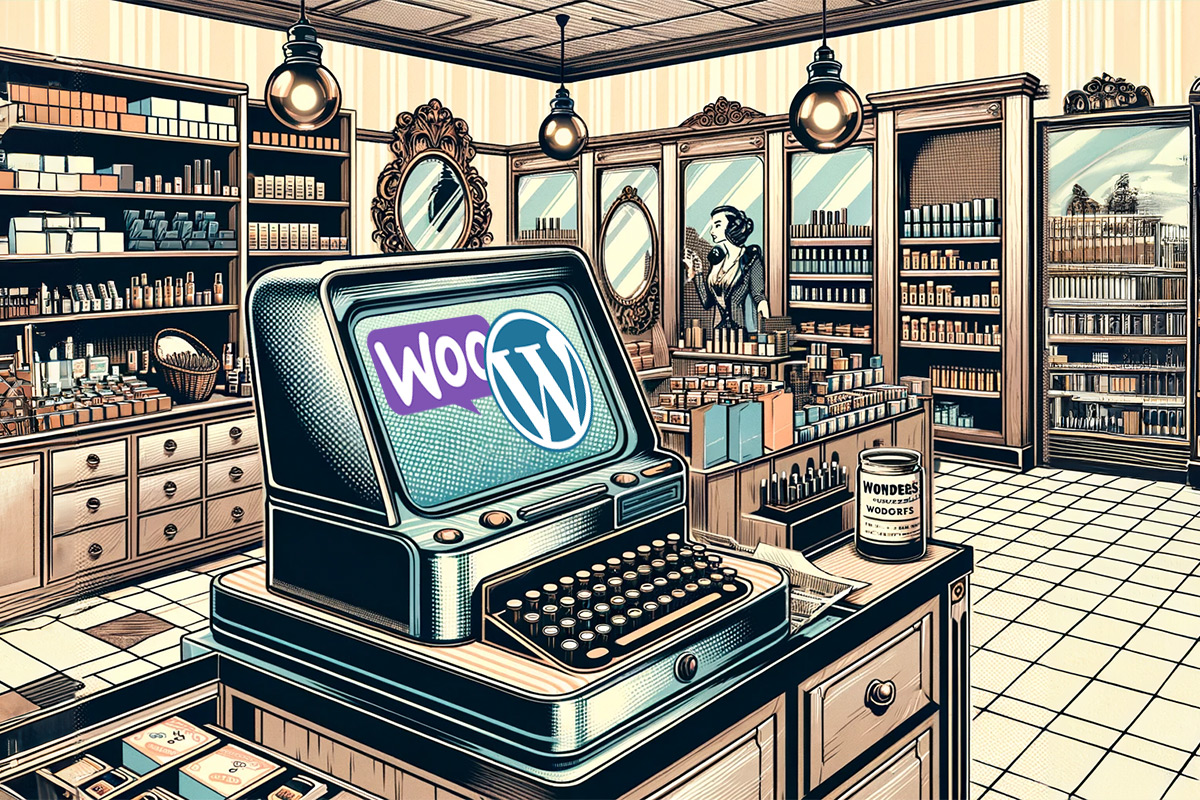The e-commerce landscape in 2024 is thriving. Consumers are digital-first, with online shopping expected to reach a staggering $6.3 trillion by year’s end. This booming market presents incredible opportunities for businesses of all sizes. But when it comes to building your online store, the choice of platform is crucial.
Enter WordPress, the world’s most popular content management system (CMS). For years, it’s been the go-to for blogs and websites, but can it handle the demands of e-commerce in 2024? Let’s delve into the world of WordPress and see if it’s the perfect fit for your online business.
Understanding WordPress
WordPress has come a long way from its humble blogging roots. Launched in 2003, it now boasts a 43% market share of all websites, powering giants like The New York Times and Disney.
Key features
- User-friendly interface: Drag-and-drop functionality makes building and managing websites a breeze, even for tech novices.
- Unmatched customizability: With thousands of themes and plugins, you can tailor your e-commerce site to your unique brand and vision.
- SEO-friendly: WordPress’s clean code and plugins like Yoast SEO make your site easily discoverable in search engines.
- Vibrant community: Millions of WordPress developers, and WordPress designers, and users offer endless support and resources.
WordPress for E-commerce: A Powerhouse with Plugins
The rise of WooCommerce, the free e-commerce plugin, propelled WordPress from a blogging haven to a serious contender in the online store arena. Its impact was nothing short of transformative, rewriting the story of WordPress and democratizing e-commerce for businesses of all sizes.
Millions of websites that once served up blog posts and news articles were suddenly armed with the power to showcase and sell products. WooCommerce, downloaded over 160 million times, unlocked this potential, turning WordPress into a versatile shop builder accessible to any entrepreneur with a dream.
This wasn’t just about tinkering on the edges; WooCommerce fundamentally shifted the landscape. Businesses weren’t limited to niche stores anymore. This plugin could handle high-volume enterprises with millions of products, scaling alongside their ambitions. Suddenly, WordPress wasn’t just a place to share your voice; it could be the engine driving your online empire.
And it wasn’t a solitary ascent. WooCommerce thrived on community. Woocommerce Developers, designers, and users joined forces, building a vibrant ecosystem of plugins, themes, and expertise. This network of support meant that no matter your technical prowess or creative vision, someone was there to lend a hand or spark inspiration.
The numbers paint a vivid picture. Nearly one in five WordPress websites now harness the power of WooCommerce, capturing a staggering 23.43% of the global e-commerce market share. It’s not just about scale, though; it’s about empowering individual businesses to reach a global audience. WooCommerce supports 66 languages and boasts millions of users across 200 countries, connecting your products with customers around the world.
WooCommerce isn’t just a plugin; it’s a revolution. It democratized e-commerce, unleashed the potential of WordPress, and fostered a thriving community of support. With its impressive stats, its boundless customization options, and its ever-evolving ecosystem, WooCommerce shows no signs of slowing down. It’s a powerhouse in the e-commerce arena, and its impact on WordPress continues to shape the future of online stores.
So, as we delve deeper into WordPress for e-commerce, remember this: WooCommerce isn’t just a tool; it’s a gateway to endless possibilities. It’s the democratization of dreams, the fuel for ambition, and the community that empowers you to build the online store you’ve always envisioned. Buckle up because the journey with WooCommerce and WordPress is just beginning!
Advantages of using WordPress for e-commerce
- Customizability: Design your shop exactly how you envision it, from product pages to checkout flows.
- Scalability: Manage small, niche stores or scale to handle large product catalogs and high traffic volumes.
- SEO-friendliness: Attract organic traffic and boost your bottom line with WordPress’s inherent SEO advantages.
- Large community and support: Never alone! A vast community of experts and resources are always ready to help.
- Integration capabilities: Connect your store with marketing tools, payment gateways, shipping services, and more.
Challenges of Using WordPress for E-commerce
While WordPress for e-commerce boasts immense potential, it’s important to acknowledge that smooth sailing isn’t guaranteed. Like any venture, building and managing an online store with WordPress comes with its own set of challenges. Some may be ripples, while others require careful navigation to avoid potential storms.
Security concerns can loom large for WordPress e-commerce stores. Unlike some dedicated platforms, maintaining security falls squarely on your shoulders. This means vigilant plugin updates and robust backup systems. Neglecting these essential tasks can leave your store vulnerable to malware, hacking attempts, and data breaches, potentially jeopardizing your customers’ trust and reputation.
Performance and scalability can also be tricky waters to navigate. While WordPress has proven its ability to handle high traffic volumes, improper configurations or resource limitations can lead to sluggish site speeds and frustrating user experiences. Optimizing images, minimizing plugins, and choosing reliable hosting is crucial to ensure your store glides smoothly even during peak traffic times.
While resources and support abound, mastering all the technical aspects might not be for everyone. Remember, you don’t have to navigate these waters alone! For those seeking a smoother journey, hiring a professional developer can be an invaluable investment. They can handle plugin updates, security protocols, performance optimization, and even custom development, freeing you to focus on your business strategy and customer experience.
Key challenges
- Security concerns: Regular updates and plugin management are crucial to keep your site secure.
- Performance and scalability: Improper configurations can impact website speed and handling peak traffic.
- Maintenance and technical know-how: WordPress requires maintenance, and some technical knowledge is helpful.
WordPress vs. Other E-commerce Platforms in 2024
WordPress has established itself as a powerful contender in the e-commerce arena, but is it the undisputed champion for your online store? Choosing the right platform depends on a delicate dance of your needs, budget, and technical comfort. WordPress faces various challenges in this ring, each with unique strengths and weaknesses. Let’s step into the arena and compare WordPress with three popular contenders: Shopify, Squarespace, and Magento, helping you crown the perfect platform for your e-commerce empire.
Shopify: The Sleek Challenger for Ease and Speed
Shopify is the poster child for user-friendly e-commerce platforms. Its drag-and-drop interface, pre-built themes, and intuitive dashboard make it ideal for beginners and businesses seeking simplicity. Hosting, security updates, and core features are bundled, offering peace of mind and streamlined management. However, this ease comes at a premium. Monthly and transaction fees can eat into your margins, and customizations are limited compared to WordPress’s open-source flexibility.
| Pros | Cons |
|---|---|
| Easiest to use, perfect for beginners. | Higher monthly and transaction fees. |
| All-in-one solution with built-in hosting and security. | Limited customization options compared to WordPress. |
| Beautiful pre-built themes and intuitive interface. | Less control over website and data compared to self-hosted platforms. |
| Scalable for medium-sized stores. |
Squarespace: The Aesthetic Architect for Design-Focused Stores
Squarespace prioritizes design and visual appeal, making it a favorite for creative businesses and photographers. Its stunning, mobile-responsive templates and seamless integration with marketing tools set the stage for impactful online stores. However, similar to Shopify, Squarespace’s ease comes at the cost of flexibility. You’re locked into their ecosystem, limiting plugin options and control over your website’s backend.
| Pros | Cons |
|---|---|
| Beautiful and responsive pre-built themes. | Limited customization and plugin options. |
| Easy to use with drag-and-drop interface. | Less control over website and data compared to WordPress. |
| Integrated marketing tools and social media management. | Higher monthly fees for e-commerce features. |
| Ideal for design-focused brands and small stores. |
Magento: The Heavyweight Champion for Large-Scale Ambition
Magento is the behemoth of e-commerce platforms built for high-volume stores and complex enterprises. Its extensive features, scalability, and robust security tools cater to businesses demanding ultimate control and customization. However, this power comes at a cost. Magento requires significant technical expertise, extensive development resources, and hefty hosting fees. It’s not for the faint of heart or the budget-conscious.
| Pros | Cons |
|---|---|
| Highly scalable for large-scale stores and complex product catalogs. | Steep learning curve, requires technical expertise. |
| Unmatched customization and development potential. | High development and hosting costs. |
| Robust security features and enterprise-grade infrastructure. | Less user-friendly compared to other platforms. |
| Ideal for established businesses with technical resources. |
Choosing the right platform is a strategic decision. For ease and speed, Shopify might be your champion. For stunning design and social media integration, Squarespace could be your match. But if you seek boundless customization and scalability for a growing empire, Magento might be the one.
Future-Proofing Your E-commerce Site with WordPress
The e-commerce landscape is a dynamic beast, constantly evolving and shifting tides. In this relentless current, building a successful online store isn’t just about choosing the right platform today; it’s about preparing for the waves of tomorrow. WordPress is the ultimate champion of transcending mere trends and empowers you to future-proof your e-commerce journey.
Beyond its vast functionalities and endless customization, WordPress possesses a secret weapon: adaptability. It isn’t just a platform; it’s a living ecosystem pulsating with innovation. A thriving developer community, a constant flow of fresh plugins and themes, and an unyielding dedication to open-source development ensure that WordPress keeps pace with the ever-changing demands of e-commerce.
Stay ahead of the curve and ensure your e-commerce store thrives in the years to come
- Embrace e-commerce trends: Mobile optimization, voice search, and personalization are key.
- Leverage plugins and tools: Enhance your store with advanced features like subscriptions and loyalty programs.
- Prioritize mobile optimization: Ensure a seamless shopping experience on all devices.
- Explore AI and machine learning: Utilize tools for personalized recommendations and chatbots.
Making the Decision: Is WordPress Right for You?
Choosing the right platform for your e-commerce journey is like picking the perfect ship to navigate the vast ocean of online commerce. Each platform offers unique features and capabilities, but not all will carry you safely and efficiently towards your destination.
Before diving into the specific specs of each platform, take a moment to chart your course. This means understanding your own unique needs and goals. Where do you see your e-commerce venture in the future? Will it be a cozy boutique or a flourishing megastore? Do you have a technical crew onboard, or will you need to hire expertise? Defining these crucial factors will guide you toward the platform that provides the perfect balance of functionality, flexibility, and cost-effectiveness for your specific voyage.
Key factors to consider when making your choice
- Business needs and goals: Define the scope of your e-commerce venture and its future growth trajectory.
- Technical skills and resources: Assess your team’s capabilities or budget for outsourcing technical tasks.
- Budget: Evaluate the costs of hosting, plugins, themes, and potential developer fees.
- Growth and scalability: Consider if WordPress can handle your anticipated growth and product expansion.
- Community and support: Value access to a large community for troubleshooting and knowledge sharing.
WordPress for E-commerce in 2024 and Beyond
WordPress stands as a powerful and adaptable option for building e-commerce websites in 2024. Its flexibility, customizability, SEO-friendliness, and extensive community support make it a compelling choice for businesses of all sizes. However, it’s crucial to acknowledge its challenges, including security concerns, maintenance requirements, and potential performance limitations.
Carefully weigh your business’s unique needs, technical capabilities, and long-term goals when deciding whether WordPress is the right fit for your e-commerce journey. By understanding its strengths and limitations, you can make an informed decision that aligns with your vision for a successful online store. Embrace the power of WordPress and unlock the potential to create an e-commerce experience that delights your customers and drives growth in the ever-evolving digital landscape.


